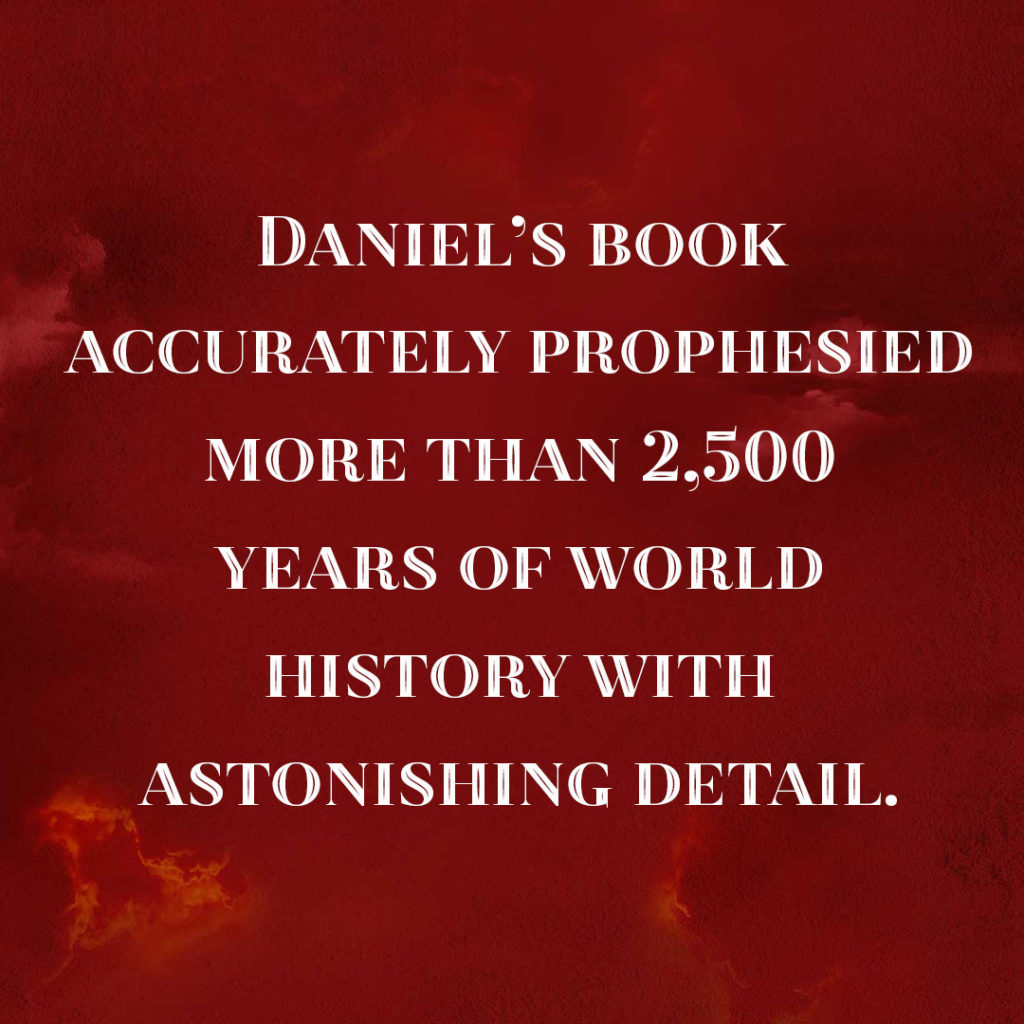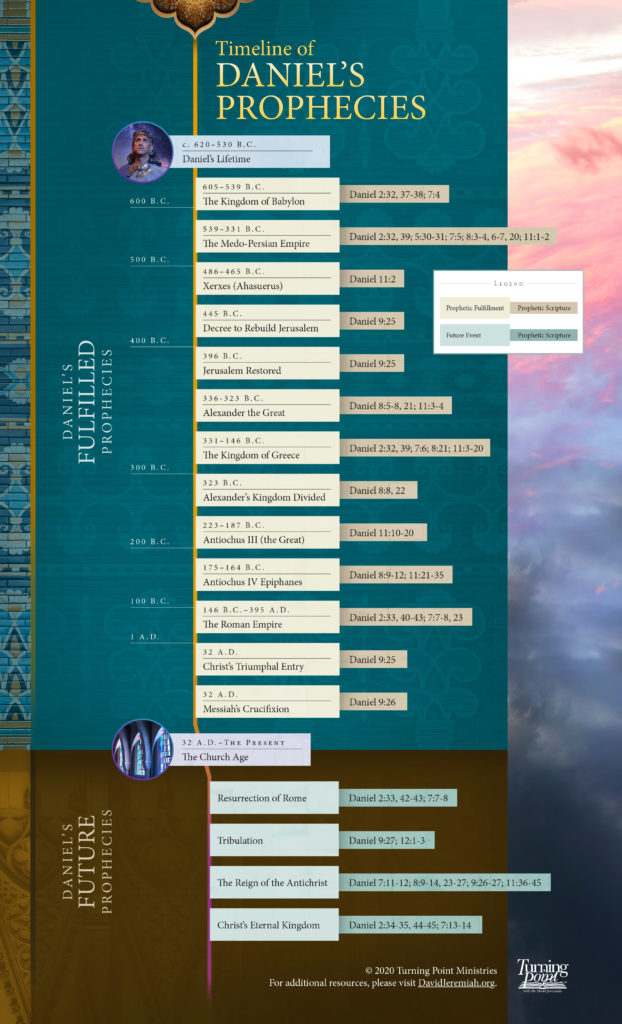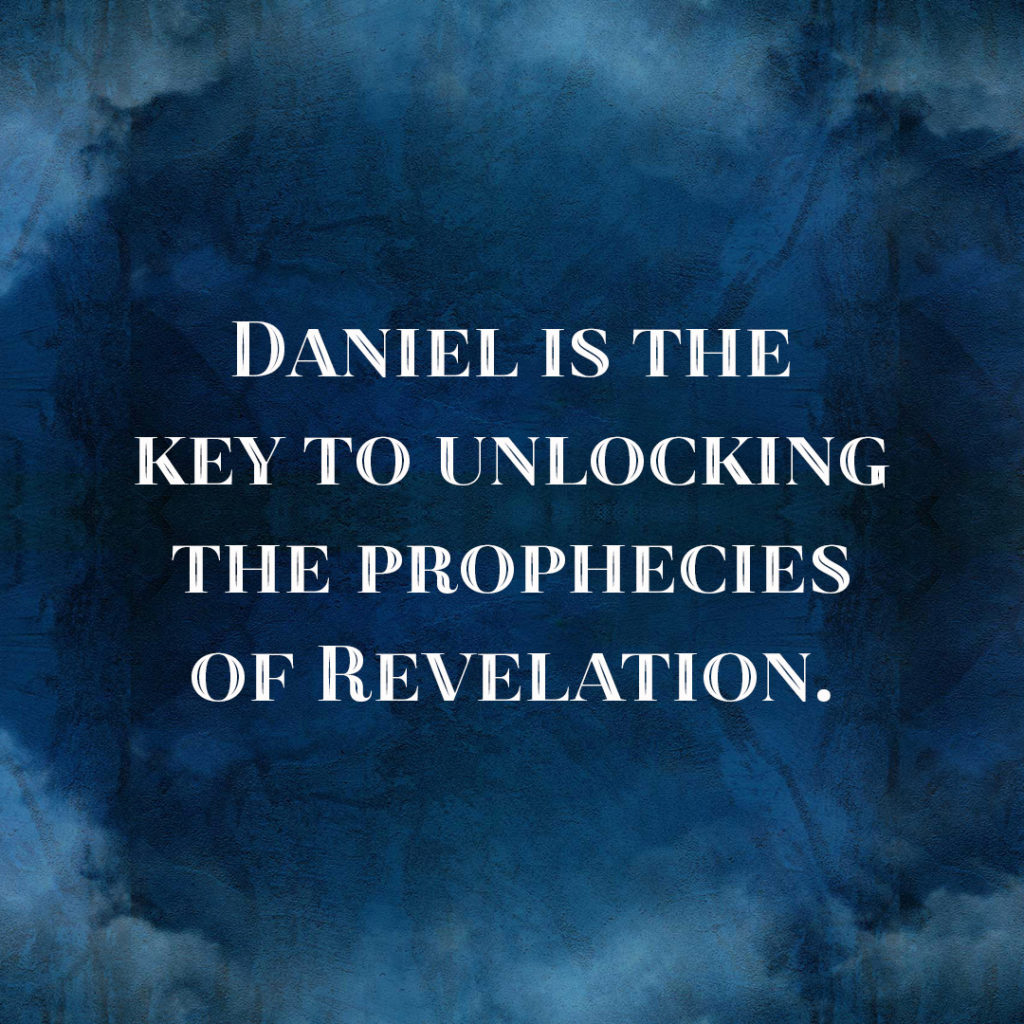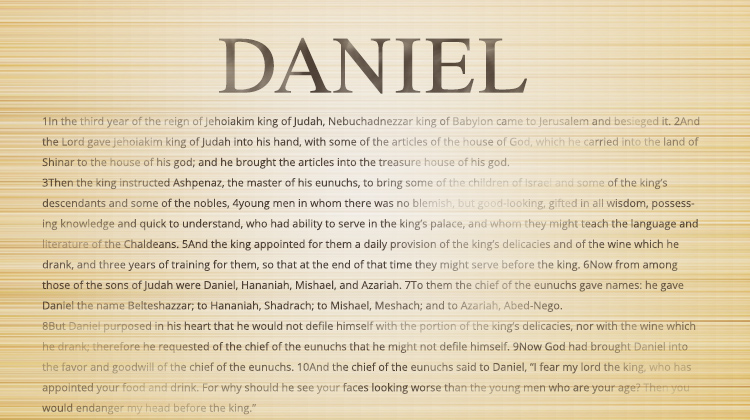(Including Interesting Facts About the End of the World)
If you spent any time in Sunday school as a child, you know about Daniel. You may have been treated to a flannelgraph presentation of Shadrach, Meshach, and Abed-Nego emerging from the fiery furnace or a rousing reenactment of Daniel proclaiming God’s deliverance on his way out of the lions’ den. You may even be aware that he was a prophet. What more would you need to know?
Daniel was much more than a Bible character on your teacher’s flannelgraph. His book accurately prophesied more than 2,500 years of world history with astonishing detail. Considering Daniel’s impressive record, we can have great confidence in his remaining prophecies—those that describe the Last Days. Daniel’s book holds the key to understanding our history and our times, and it reassures us about God’s absolute authority over our future.

We should study the book of Daniel to understand its prophetic accuracy.
Daniel lived in the fifth century B.C. At that time, Babylon was the world’s greatest superpower, having conquered the Assyrian capital of Nineveh around 612 B.C. and Jerusalem in 605 B.C. Newly formed Greek city-states were squabbling with each other over land. Rome also was a small city-state, and Persia was emerging on the world stage.
From this vantage point, Daniel accurately predicted the rise and fall of four successive empires, beginning with Babylon (Daniel 7:1-8, 15-28). His visions anticipated the reign of Alexander the Great, the four generals who divided Greece after Alexander’s death, Israel’s rejection of the Messiah, and the cruelty of Antiochus Epiphanes that prompted the Maccabean Revolt.
His book is so accurate and so specific that critics have tried to suggest it’s a fraud, written after the prophesied events occurred. But there is considerable evidence to support Daniel’s authenticity. Among that proof is the fact that the book was known to exist and was accepted by Jews long before the destruction of the temple in A.D. 70 (an event predicted in Daniel 9:26). In Matthew 24:15, Daniel received an endorsement from Jesus Himself, who quoted him and referred to him as “Daniel the prophet.”
Did you know there are more than 350 Messianic prophecies in the Old Testament, and thirteen of those are found in the book of Daniel? Written centuries before the birth and life of Jesus Christ, these prophecies offer us a renewed passion and resolve to live boldly for God today, knowing that we are alive at a special time in history. There is not one prophecy of Jesus Christ left unfulfilled that is standing in the way of His return!
Here’s where you find Jesus in Daniel:
| Scripture | Prophecy | Fulfilled |
|---|---|---|
| Daniel 2:34-35 | Stone cut without hands | Acts 4:10-12 |
| Daniel 2:44, 45 | His kingdom triumphant | Luke 1:33; 1 Corinthians 15:24; Revelation 11:15 |
| Daniel 7:13-14a | He would ascend into heaven | Acts 1:9-11 |
| Daniel 7:13-14b | Highly exalted | Ephesians 1:20-22 |
| Daniel 7:13-14c | His dominion would be everlasting | Luke 1:31-33 |
| Daniel 7:27 | Kingdom for the saints | Luke 1:33; 1 Corinthians 15:24; Revelation 11:15 |
| Daniel 9:24a | To make an end to sins | Galatians 1:3-5 |
| Daniel 9:24b | He would be holy | Luke 1:35 |
| Daniel 9:25 | Announced to His people 483 years, to the exact day, after the decree to rebuild the city of Jerusalem | John 12:12-13 |
| Daniel 9:26a | Jesus killed | Matthew 27:35 |
| Daniel 9:26b | Die for the sins of the world | Hebrews 2:9 |
| Daniel 9:26c | Jesus killed before the destruction of the temple | Matthew 27:50-51 |
| Daniel 10:5-6 | Messiah in a glorified state | Revelation 1:13-16 |
Throughout history, Daniel’s prophecies have proven to be astonishingly precise. Armed with an understanding of his prophetic accuracy, we can be confident about the reliability of his remaining predictions.

We should study the book of Daniel to understand end-times prophecy.
Understanding end-times prophecy is like putting together a jigsaw puzzle of a blackline sketch. God gave different pieces to several biblical authors. If we want to see the whole picture, we have to fit them all together. Even then we won’t capture every detail because some aspects of the Last Days won’t be revealed in advance, but each author’s pieces are essential to completing the picture.
When Daniel received his end-times revelation, he admitted he couldn’t understand it. He asked to know more, but his angelic messenger refused, saying, “Go your way, Daniel, for the words are closed up and sealed till the time of the end” (Daniel 12:9). He already knew everything God meant for him to know. His prophecy contains the puzzle’s edge pieces—the framework for what is detailed in Matthew 24 and 25 and the book of Revelation. But Daniel was missing some of the necessary pieces to complete his own prophecy.
The Word of God is now complete, which means we hold all the puzzle pieces. We can fit them together to form an accurate picture of the End Times. Some people immediately turn to Revelation for prophecy, but Daniel is the key to unlocking it. Without his prophecy, we can’t understand Matthew 24–25, Luke 21, Mark 13, or most of the book of Revelation.

Daniel’s bird’s-eye view reveals successive earthly kingdoms interlocked together—the Babylonian kingdom succeeded by the Persian, the Persian by the Greek, and the Greek by the Roman—exactly as it happened in history. But the final element of his vision was the eventual establishment of “a kingdom which shall never be destroyed”—a kingdom that “shall break in pieces and consume all these [previous] kingdoms, and it shall stand forever” (Daniel 2:44). Through Daniel, God revealed His plans to provide hope for all mankind in the future reign of “One like the Son of Man”—His Son, Jesus Christ—whose kingdom “shall not be destroyed” (Daniel 7:13, 14).
We should study the book of Daniel to understand God’s sovereignty over troubled times.
A study of Daniel is highly relevant because it portrays a period of history that is much like what ours is fast becoming. Even in America, a nation founded on Christian principles, the culture is increasingly secular. Political agendas promote causes that rebel against God’s created order. Schools introduce children to the five pillars of Islam and Eastern meditation while prohibiting Christian clubs from meeting. Businesses that promote biblical values are boycotted and slandered. Each day God’s people face a hostile culture, and it is up to us to prayerfully study God’s Word as we seek to discern where the lines should be drawn.
The spirit of Babylon is in ascendancy, and biblical prophecy tells us it will continue to rise until it dominates the entire world. Already, according to Open Doors USA, “One in nine Christians experience high levels of persecution worldwide,” and approximately eleven Christians are killed for their faith each day.1 It is troubling to see evil spreading, but Daniel reassures us that God anticipated this day, that He works through the direst circumstances, and that He has a plan for the future.

Even those who find themselves on earth during the Tribulation can trust God to limit the days of their suffering. The same God who limited the Jews’ Babylonian captivity to seventy years will confine the Tribulation to the minimum amount of time necessary to accomplish His purposes. According to Daniel’s Seventy-Weeks prophecy, the Tribulation will last for seven years, and the worst part, the Great Tribulation, will last for exactly three-and-a-half years (Daniel 9:27).
Several other passages of Scripture confirm this timeline:
| Scripture | Description of the Tribulation |
|---|---|
| Daniel 7:25 | A time and times and half a time |
| Daniel 12:7 | A time, times, and half a time |
| Revelation 11:2 | Forty-two months |
| Revelation 12:6 | One thousand two hundred and sixty days |
| Revelation 12:14 | For a time and times and half a time |
| Revelation 13:5 | Forty-two months |
Why will the Tribulation last for this amount of time? The Bible says that is how long it will take for “the power of the holy people [to be] completely shattered” (Daniel 12:7). In other words, that is how long it will take for Israel to be purged, brought into obedience, and God’s purpose to be completed. Joseph Seiss has made this observation about the length of the Great Tribulation: “Our Lord ministered on earth three and a half years, and the Antichrist shall enact his Satanic ministry for the same length of time.”2 As the Creator of time, God is not limited by it, but He uses time to reveal His plans and His power to us.
Daniel’s directions for today
Near the end of his book, Daniel asked the question, “How will all this finally end?” (12:9, NLT) The angel Gabriel refused to tell him anything more, but he offered Daniel three final instructions that also apply to us today.
1. Protect the Prophecy
Protect the prophecy for those who will need it as the end draws near (Daniel 12:4). We benefit from Daniel’s book because God’s people have protected it for more than 2,500 years. Now it’s our turn. We can preserve the words of Daniel’s prophecy by reading them, studying them, determining to understand them, and obeying them. We can teach them to our children and encourage our pastors and teachers to explain them. We study the book of Daniel because it’s God’s Word, and He wants us to know what it says.
2. Proceed With Life
Proceed with life by accepting the mystery of what has been given and carrying on (Daniel 12:9). Some people love to sit around and discuss the implications of God’s sovereignty and man’s free will. Both are true, but we’re not going to figure them out completely right now. Our job is to learn about God’s major plan for the future, and then live life as God’s children. We aren’t meant to get caught up in all the details. We don’t fully understand what God is doing, but we know what we’re doing. God will manage His sovereignty without us; we are charged with managing our free will and trying to win everybody we can to Jesus Christ.
3. Prepare for the Future
Prepare for the future that awaits us in the new kingdom of Jesus Christ. Gabriel directed Daniel to “go your way till the end” (Daniel 12:13, emphasis added). This man was in his eighties, but God assured him there was more work for him to do and that he would one day arise to his reward. As long as there is breath in our lungs, God has work for us to do too. Studying this prophecy should make us anxious to make sure nobody we know will miss out on heaven.
It’s appropriate to think of earth’s final days as the End Times, but the end of the Tribulation will mark the beginning of something wonderful and new. At that time, the final stage of God’s marvelous plan of redemption will begin with Jesus’ establishment of the fourth kingdom of Daniel’s prophecy—a kingdom where “there shall be no more death, nor sorrow, nor crying. There shall be no more pain, for the former things have passed away” (Revelation 21:4). His kingdom will fulfill our greatest hopes by permanently replacing this present world of chaos, disorder, and evil.
Sources:
1“World Watch List 2019: The 50 countries where it’s most dangerous to follow Jesus,” Open Doors USA, https://www.opendoorsusa.org/wp-content/uploads/2019/01/2019_World_Watch_List_Booklet.pdf, 5.
2Joseph A. Seiss, Voices From Babylon, (Philadelphia: Castle, 1879), 311.
~ ~ ~ ~ ~
For deeper study of Revelation and prophecy, visit Dr. Jeremiah's Prophecy Academy where you will find a panorama of prophetic materials to enhance your understanding of God's Plan for the end of the world.
Continue your study of biblical prophecy with these other popular articles by David Jeremiah:
Seven Churches of Revelation Bible Study
Becoming a Cashless Society—A Financial Sign of the End Times
What Is the Tribulation?
Why Would Anyone Accept the Mark of the Beast?
What is the Great White Throne Judgment in Revelation?
The False Prophet in the Book of Revelation
11 Answers to Questions About the End Times
What Is the Rapture?
What Is the Millennium? 7 Answers to 7 Questions
4 Signs of the End Times
the 144,000 in the Book of Revelation
The Revelation Prophecy Timeline
See all prophecy articles here >

